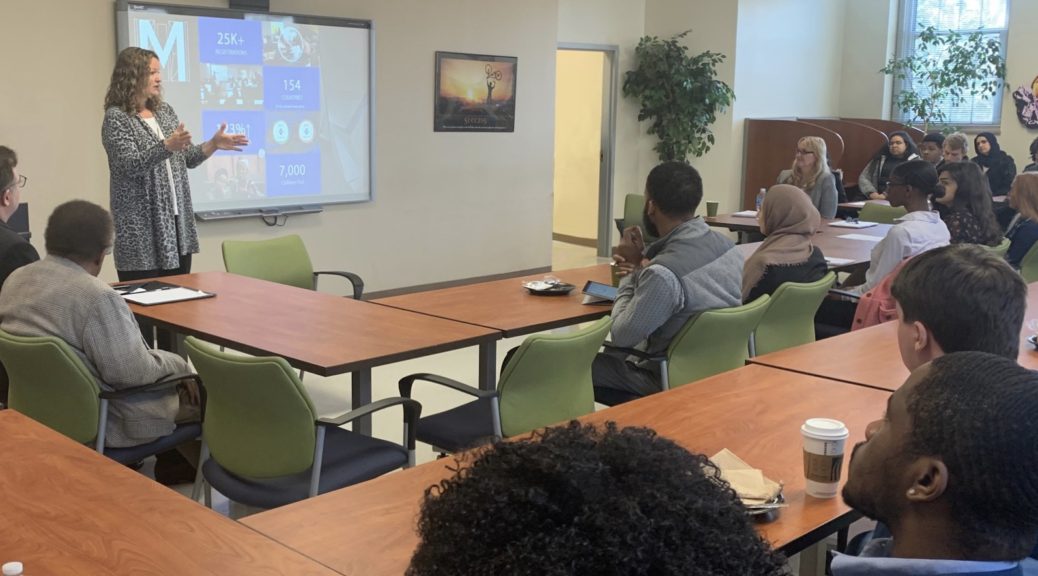NASHVILLE, Tenn. (TSU News Service) – Landing a job at a Fortune 500 company usually means earning a sizable salary and enjoying perks like a big signing bonus and paid moving expenses. Tennessee State University 2020 graduate Malik City recently had that experience.

The Nashville native and computer science major was hired by Bank of America as a software engineer. City will earn $94,000 his first year, which includes a $10,000 signing bonus. He credits his time at TSU and being a part of the Enterprise Systems Computing initiative for his new employment opportunity.
“I feel very fortunate and very thankful to TSU for the preparation I received, which made all of this possible,” said City, who midway through his college career, switched from electrical engineering to computer science with the infusion of enterprise computing.
“TSU is a big part of who I became as a man and a professional. I had great professors in the computer science department who gave me a great foundation and knowledge in many aspects of computer science and the enterprise system.”
The enterprise computing initiative was launched at TSU in 2014 to help prepare students to compete for high-paying enterprise internships and jobs. Since then, up to 22 students have been placed with enterprise companies earning annual average starting salaries of more than $84,000. TSU is the only Tennessee institution that offers courses in enterprise computing.

John Thompson, a former IBM senior manager, is TSU’s enterprise systems consultant. He works with major Fortune 500 companies to identify their areas of need and pass that information over to the deans and chairs to identify the best way to infuse the requirements in the curriculum.
“The world’s largest banks, travel agencies, credit card transactions, global retailers, and communications service providers run on enterprise system,” said Thompson. “This requires graduates in all majors such as criminal justice, mass communication, computer science, business, engineering, health science, agriculture, education, etc., to have some degree of base knowledge in enterprise computing concepts.”
There are 17 enterprise companies in Tennessee, including eight in Nashville, Thompson said. They include HCA, Mellon Bank, Comdata, BMI, State of Tennessee, Bridgestone, Amazon, and Vanderbilt.

“TSU, being the only school in Tennessee offering courses in this area, can be a major source to fill the huge demand for enterprise computing skills that is being created by the retiring baby boomer generation,” he said.
Dr. Ali Sekmen, chair of TSU’s Department of Computer Science, said enterprise computing and related courses are offered to ensure that students possess the fundamental knowledge that “major companies are looking for in this area.”
“Students like Malik, who have a fundamental understanding of enterprise systems, are more competitive as they enter the pipeline of a qualified workforce to replace the current retiring workforce,” Sekmen said.
Antoinette Duke, associate director of the TSU Career Development Center, added that TSU’s overall goal is to ensure that students leaving the university have the skill sets and experience needed to successfully compete for top jobs in business and industry.
“We are committed to providing services to our students that prepare them for meaningful career goals,” Duke said.
According to Dr. Jacqueline Mitchell, professor and Enterprise Systems manager, the program is opened to students in all disciplines.
“Malik’s success is one of the major achievements of the enterprise program at TSU, but we don’t want students to think this is just for computer science majors,” Mitchell said. “We want to attract other students to this program. It was designed under the Office of Academic Affairs for students in any discipline.”
City, who will be relocating to his new company’s headquarters in Charlotte, North Carolina, encouraged other students to take advantage of the program, which he called a “high industry need area.”
“I was very fortunate to come into the industry right after college,” said City. “My mainframe experience did it for me. That extra edge separated me from the competition, because my manager said by having that experience proved that I had the willingness and appetite for knowledge.”
In addition to software engineer, graduates of the Enterprise Systems Computing would be qualified for jobs such as network support specialist, network analyst, network engineer, PC support specialist, and PC help desk.
For more information on TSU’s Enterprise Systems Program, visit http://www.tnstate.edu/computer_science/.
Department of Media Relations
Tennessee State University
3500 John Merritt Boulevard
Nashville, Tennessee 37209
615.963.5331
About Tennessee State UniversityFounded in 1912, Tennessee State University is Nashville’s only public university, and is a premier, historically black university and land-grant institution offering 39 bachelor’s degree programs, 24 master’s degree programs, and seven doctoral degrees. TSU is a comprehensive research intensive institution with a R-2 Carnegie designation, and has a graduate school on its downtown Avon Williams Campus, along with the Otis Floyd Nursery Research Center in McMinnville, Tennessee. With a commitment to excellence, Tennessee State University provides students with a quality education in a nurturing and innovative environment that prepares them as alumni to be global leaders in every facet of society. Visit the University online at tnstate.edu.



